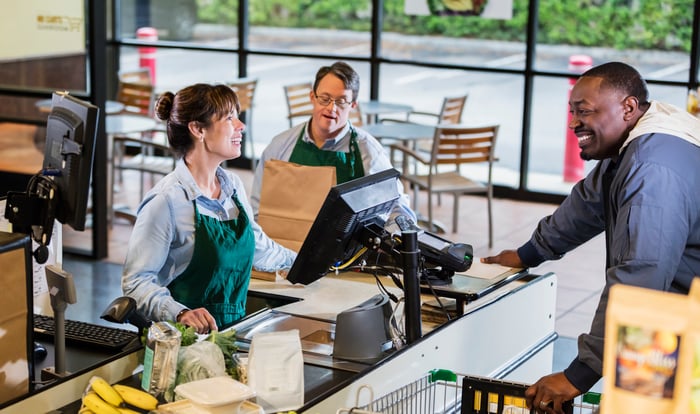Consumer staples icon Colgate-Palmolive (CL 1.38%) reported solid second-quarter 2022 earnings, especially given the inflationary headwinds it and its peers are facing. However, not all of the news was good, even though the negative facts were, pretty much, to be expected.
Here's a look at the mixed numbers in the quarter and what investors should be thinking about in the future.
A good/bad quarter for Colgate-Palmolive
Colgate-Palmolive reported organic sales growth of 9% in the second quarter, which is a very strong number for a consumer staples company. The company was able to push through big price increases across its brand portfolio (8.5 percentage points) while seeing slight volume and mix benefits (0.5 percentage points each). Some geographic regions were stronger than others and the company's pet food business was a particular standout, but overall the company had a decent quarter on the organic sales front.

Image source: Getty Images.
And yet adjusted earnings were lower by around 10%. Although the company reported that it acted "boldly" on pricing, it can only push so hard before it pushes consumers toward cheaper alternatives. So Colgate-Palmolive looks like it is behind the curve a little in its efforts to increase prices in the face of its own rapidly increasing costs. Inflation is impacting consumers and companies alike.
The end result for Colgate-Palmolive is a margin squeeze. Operating profit as a percentage of sales dropped across every division in the quarter compared to 2021. Some product lines were hit harder than others, but the overall drop for the base business was a hefty 2.8 percentage points.
Not good, but nothing's wrong
It clearly wouldn't be correct to suggest that this was good news, but it also isn't particularly dire news. When inflation hits, consumer products companies like Colgate-Palmolive have a well-worn playbook to use. There are a lot of moving parts, but it boils down to price increases, cost cutting, and patience. For investors, the key is to monitor the trends without getting too upset because of near-term volatility.
Colgate-Palmolive didn't achieve Dividend King status by accident. It has been through inflationary periods before and managed to survive just fine. And yet there are implications, most notably decreased profitability as price increases work their way through the market. There are two key factors here.
First, every peer, including store brands, is going through the same thing right now. Thus, every product's price is basically on the rise; Colgate-Palmolive is unlikely to completely price itself out of contention. Second, if history is any guide, inflation will eventually subside. At that point, Colgate-Palmolive's profit margins will likely strengthen again. It's just the cycle of the consumer staples space.
For long-term shareholders, the goal is to find a way to ride through this period without losing too much sleep. A good way to do that is to focus on the dividends you are collecting. The company increased its dividend by 4.4% in the second quarter. Recent history suggests that another hike will likely come in the second quarter of 2023. Focus on those checks, since continued dividend hikes are a clear indication that the company believes the current issues are manageable.
For investors that don't own the stock, but would like to, you might want to keep an eye on it as price increases get harder to push through. Notably, peers like Procter & Gamble are warning that there's a less-than-auspicious shift taking place in consumer buying habits (i.e. more digital sales). It is unlikely that Colgate-Palmolive will sidestep that shift, noting that the company is calling for full-year 2022 organic sales growth of 5% to 7% -- below the second-quarter result. And adjusted earnings are slated to fall year over year. If, upon seeing such results, Wall Street decides to sell the stock, you might want to step in at the lower price point.
Metrics like this in this economy are normal
Businesses don't go up or down in a straight line; they shift between "good" periods and "bad" periods. The hope is that the larger trend is up even through a smaller, shorter down period as trends vacillate. Colgate-Palmolive has proven over time that it can handle difficult periods like the one it is facing today. If you are a long-term investor, you should give management the benefit of the doubt because it doesn't look like there's anything fundamentally wrong here.





